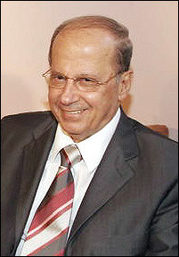 By Lin Noueihed, RABIEH, Lebanon, (Reuters) – Lebanese Christian opposition leader Michel Aoun said on Thursday the government should resign if it was unable to end a political crisis that has paralysed decision-making. Aoun, who heads a major parliamentary bloc but did not join a cabinet formed after Syria withdrew from Lebanon in April, called for early elections as a prelude to replacing pro-Syrian President Emile Lahoud, who has been under pressure to resign.
By Lin Noueihed, RABIEH, Lebanon, (Reuters) – Lebanese Christian opposition leader Michel Aoun said on Thursday the government should resign if it was unable to end a political crisis that has paralysed decision-making. Aoun, who heads a major parliamentary bloc but did not join a cabinet formed after Syria withdrew from Lebanon in April, called for early elections as a prelude to replacing pro-Syrian President Emile Lahoud, who has been under pressure to resign.
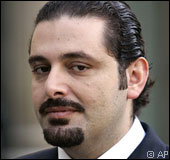 By Nora Boustany, Saad Hariri , a Lebanese legislator and the son of slain prime minister Rafiq Hariri , said Wednesday that a recently renewed alliance between Iran and Syria and fallout from Tehran’s nuclear program could pose a threat to Lebanon."There is an international crisis on this issue. They will have to answer to the international community, not Lebanon," he said at a leadership forum at the Woodrow Wilson International Center for Scholars.
By Nora Boustany, Saad Hariri , a Lebanese legislator and the son of slain prime minister Rafiq Hariri , said Wednesday that a recently renewed alliance between Iran and Syria and fallout from Tehran’s nuclear program could pose a threat to Lebanon."There is an international crisis on this issue. They will have to answer to the international community, not Lebanon," he said at a leadership forum at the Woodrow Wilson International Center for Scholars.
Hariri came to Washington this week to meet with President Bush , Vice President Cheney , Secretary of State Condoleezza Rice , national security adviser Stephen J. Hadley and the assistant secretary of state for Near Eastern affairs, C. David Wel c h .Iran’s standoff with international institutions over its nuclear ambitions could have an impact on Lebanon, Hariri said, given the armed presence in the country of Hezbollah. Lebanon should be spared possible repercussions, he said.
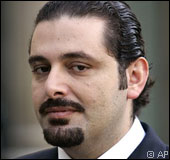 WASHINGTON – Lebanese parliament member Saad Hariri, son of slain prime minister Rafic Hariri, expressed interest in seeing the U.S. send equipment to help Lebanon protect its borders.
WASHINGTON – Lebanese parliament member Saad Hariri, son of slain prime minister Rafic Hariri, expressed interest in seeing the U.S. send equipment to help Lebanon protect its borders.
Speaking to a crowd of 150 and nearly a dozen TV cameras, Hariri, named to Forbes’ list of the World’s Richest People, also mentioned he aims to discuss this and other issues–including the investigation into his father’s death–with President Bush during a three-day visit to Washington. The pit stop follows meetings earlier in January with French President Jacques Chirac and U.S. Vice President Dick Cheney during his Middle East tour focused on the Lebanon-Syria crisis and regional security.
Hariri has lived for the past few months in a self-imposed exile in Saudi Arabia, where he holds dual citizenship and lives off a $1.25 billion fortune. Saudi Arabia is also the headquarters for Saudi Oger, a $3.25 billion (sales) construction and telecommunications company that employs 38,000 and was led by Hariri until his political career took off last year.
The leader of the Lebanese group Hizbullah on Tuesday told family members of Lebanese citizens missing in Syria that he would work with President Bashar Assad to try to learn the fate of their loved ones. Sheikh Hassan Nasrallah, a strong Syrian ally, issued the pledge during a meeting with about a dozen family members […]
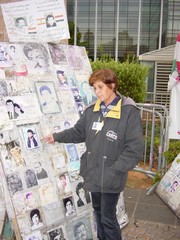 BEIRUT, 23 Jan 2006 (IRIN) – Ten months after the start of a sit-in protest in front of UN headquarters in Beirut, the families of Lebanese nationals who have disappeared or been detained in Syria say their campaign for information is making little progress. "None of our demands have been met and nothing new is being done on the issue," said Samia Abdallah, whose brother, a member of the Palestinian National Liberation Movement in Lebanon, was arrested by Syrian agents in 1984.
BEIRUT, 23 Jan 2006 (IRIN) – Ten months after the start of a sit-in protest in front of UN headquarters in Beirut, the families of Lebanese nationals who have disappeared or been detained in Syria say their campaign for information is making little progress. "None of our demands have been met and nothing new is being done on the issue," said Samia Abdallah, whose brother, a member of the Palestinian National Liberation Movement in Lebanon, was arrested by Syrian agents in 1984.
Families of the missing are demanding that the UN Security Council consider the implementation of last year
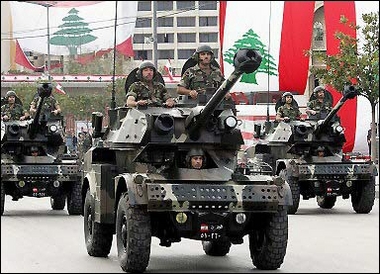 DUBAI, 23 January (IRIN) – Political observers often cite Lebanon as an example of freedom and democracy amidst other non-democratic states in the region. They point to the country’s relatively free press, and the fact that no major political parties have been banned. Consequently, Lebanon’s political landscape has not been dominated by one family or party, but by a variety of faces and parties.
DUBAI, 23 January (IRIN) – Political observers often cite Lebanon as an example of freedom and democracy amidst other non-democratic states in the region. They point to the country’s relatively free press, and the fact that no major political parties have been banned. Consequently, Lebanon’s political landscape has not been dominated by one family or party, but by a variety of faces and parties.
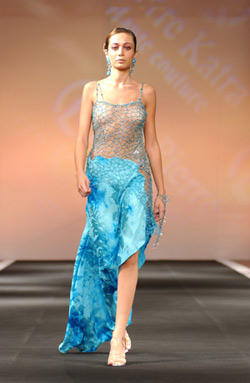 Pierre and Hadi Katra announce their first appearance in the United States and New York (NY) Fashion Week this February 3rd-4th at Grand Hyatt. After long negotiations with International Fashion Shows Headquarters in Switzerland, the Katras have agreed to present an exclusive collection for the organization’s special fundraiser gala."We have personally met with Sianetta Sunnasee of International Fashion Shows, and we find her intent to be sincere and true," says Pierre Katra. "Our group is designing an exclusive collection, specifically for the New York Fashion Week event.
Pierre and Hadi Katra announce their first appearance in the United States and New York (NY) Fashion Week this February 3rd-4th at Grand Hyatt. After long negotiations with International Fashion Shows Headquarters in Switzerland, the Katras have agreed to present an exclusive collection for the organization’s special fundraiser gala."We have personally met with Sianetta Sunnasee of International Fashion Shows, and we find her intent to be sincere and true," says Pierre Katra. "Our group is designing an exclusive collection, specifically for the New York Fashion Week event.
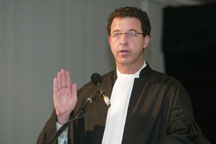 DAMASCUS/BEIRUT, 19 Jan 2006 (IRIN) – With the imminent arrival of Serge Brammertz, the United Nation
DAMASCUS/BEIRUT, 19 Jan 2006 (IRIN) – With the imminent arrival of Serge Brammertz, the United Nation
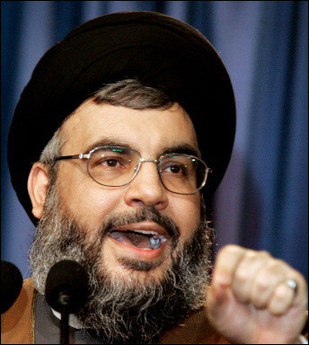 BEIRUT (Reuters) – The head of Lebanon’s Hizbollah guerrilla group has called on Saudi Arabia and Egypt to intervene to resolve a crisis brewing in Lebanon. In an interview published on Wednesday in the pan-Arab al-Hayat newspaper, Sayyed Hassan Nasrallah appeared to back Saudi mediation to ease tensions between Lebanon and Syria, and called for efforts to resolve rifts among Lebanese leaders.
BEIRUT (Reuters) – The head of Lebanon’s Hizbollah guerrilla group has called on Saudi Arabia and Egypt to intervene to resolve a crisis brewing in Lebanon. In an interview published on Wednesday in the pan-Arab al-Hayat newspaper, Sayyed Hassan Nasrallah appeared to back Saudi mediation to ease tensions between Lebanon and Syria, and called for efforts to resolve rifts among Lebanese leaders.
"Intervention is a must and there can’t be any Arab delay to do what is necessary," Nasrallah said. "The situation in Lebanon is bad and it has dangerous repercussions." Lebanon has been gripped by a political crisis since pro-Syrian Shi’ite ministers boycotted the cabinet five weeks ago, paralyzing a government dominated by anti-Syrian officials of a Sunni-led parliamentary majority coalition.Saudi Foreign Minister Prince Saud al-Faisal has said that Saudi Arabia has presented Lebanon and Syria with a plan to defuse tensions between the two countries.
.
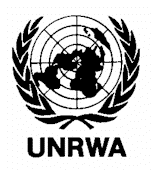 BEIRUT, 18 January (IRIN) – The UN Relief Works Agency for Palestine Refugees (UNRWA) refuted accusations that it had reduced the quality of medical care for Palestinian refugees in Lebanon, following reports of deteriorating health services. "UNRWA has reduced neither the quantity nor the quality of medical care," said Hoda al-Turk, assistant public information officer at UNRWA. "On the contrary, it has signed an agreement with a hospital that offers first class medical care at a very reasonable cost."
BEIRUT, 18 January (IRIN) – The UN Relief Works Agency for Palestine Refugees (UNRWA) refuted accusations that it had reduced the quality of medical care for Palestinian refugees in Lebanon, following reports of deteriorating health services. "UNRWA has reduced neither the quantity nor the quality of medical care," said Hoda al-Turk, assistant public information officer at UNRWA. "On the contrary, it has signed an agreement with a hospital that offers first class medical care at a very reasonable cost."



